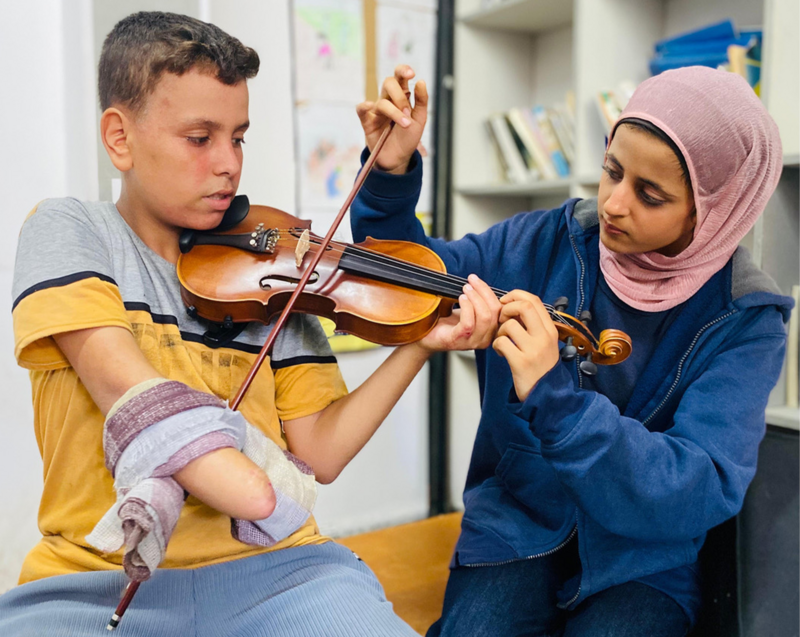The Electronic Intifada 25 October 2024

Muhammad Abu Aida, 14, is determined to learn the violin with the help of Sama Najm, 16.
Muhammad Abu Aida, 14, and his mother, Muna, had hoped they had found some measure of safety in the Nuseirat refugee camp, even though the sounds of explosions resonate constantly and feelings of fear permeate every corner.
But the UN school at which they had sought shelter eventually proved to provide no protection.
On 16 July, ten months after they were forcibly displaced from their home, Israeli warplanes bombed the school that had become their haven.
The attack partially destroyed the school, killed 23 people, and wounded more than 70, including Muhammad, whose right hand had to be amputated.
He spent two weeks in hospital. During the psychological support sessions, which included music, Muhammad found himself drawn to Sama Najm’s violin playing.
A student at the Edward Said National Conservatory of Music branch in Gaza City, Sama, 16, is also displaced. She volunteers to help younger children cope with the trauma of war through music.
“I cared for Muhammad. I witnessed his injury and was deeply affected by it. I wanted to do something for him,” she told The Electronic Intifada.
“I noticed that he focused on me while I played, so I offered him a chance to try it himself. I was surprised by how happy he was. I thought of a way to secure the bow and found a piece of cloth to make it work.”
For Muhammad, music has become a powerful vessel to express his pain and aspirations.
“I was struck by shrapnel from an Israeli missile,” he told The Electronic Intifada. “But I refuse to let this tragedy define me. I will rise from this darkness. I want to live fully. I want to achieve my dreams with every ounce of my being.”
Determination
His determination is plain.
“I dream of receiving a prosthetic hand,” he said. “I will create the most beautiful melodies.”
He is hopeful that international organizations might hear of his situation and step in to help him get a new hand.
“I believe this will not only restore my ability to play but also unleash a depth of emotion in my music that I have yet to explore.”
For him and others in their shelter – the same school Israel bombed in July – impromptu musical sessions have emerged as a symbol of hope, and as a way to express the indomitable spirit of life amid the ruins.
The music they play filters through the partially destroyed buildings, filling the air with warmth and resilience, reminding them of the beauty that still exists in their world.
A tearful Muna said the amputation had shattered her son in ways she couldn’t describe, though his passion for music had reinvigorated him.
“Muhammad has become very sensitive after his injury and refuses to return to education,” she told The Electronic Intifada.
“But when he found his passion for playing the violin, his confidence and will to continue returned. I still feel pain for my son and sometimes can’t look into his eyes, but I feel reassured that he has found something he loves, with the violin.”
For his part, Muhammad said he was focused and determined.
“I will practice tirelessly until I become the musician I know I can be.”
Rajaa Jadili is a content writer based in Gaza.





